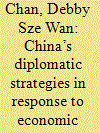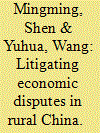| Srl | Item |
| 1 |
ID:
174863


|
|
|
|
|
| Summary/Abstract |
How do societal actors in the host country matter to Beijing’s diplomatic strategies? In the course of political transition in Myanmar, the Myitsone Dam was suspended in 2011, and the China–Myanmar High-Speed Railway was reportedly halted in 2014. Since then, Beijing is said to have adopted public diplomacy in response to these economic setbacks. However, this article finds variations in Beijing’s approaches; Beijing actively engaged with the dam challengers, but not the railway opponents, who offered less of a challenge. Moreover, Beijing tolerated the project’s suspension in the dam case, but ramped up pressure in the railway case by increasing Naypyitaw’s costs of defection. Beijing’s inconsistent diplomatic approaches are attributed to different levels of social opposition observed in the anti-Chinese project movements. As such, Beijing has the propensity to bypass societal actors and pressure Naypyitaw for project continuation if it perceives that social opposition is not a major obstacle in bilateral economic cooperation.
|
|
|
|
|
|
|
|
|
|
|
|
|
|
|
|
| 2 |
ID:
088692


|
|
|
| 3 |
ID:
139271


|
|
|
|
|
| Summary/Abstract |
Based on fieldwork done in Ekaterinburg, this article deals with the enforcement of legal decisions about economic disputes in the late 2000s in Russia. As state employees, bailiffs are responsible for the implementation of court decisions but their efficiency depends on the cases they deal with. In the most successful cases, they are backed by private enforcers, hired by the claimant and often coming from the law enforcement agencies. This common work reflects an informal public–private partnership from below in which bailiffs and private enforcers co-execute judicial decisions. Such autonomous public–private power configurations at local level challenge the governmental claim to build a ‘power vertical’ in Russia from the top.
|
|
|
|
|
|
|
|
|
|
|
|
|
|
|
|